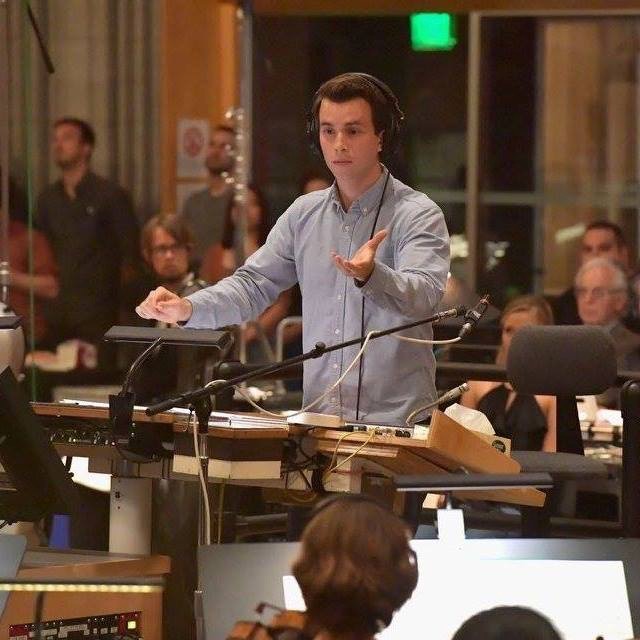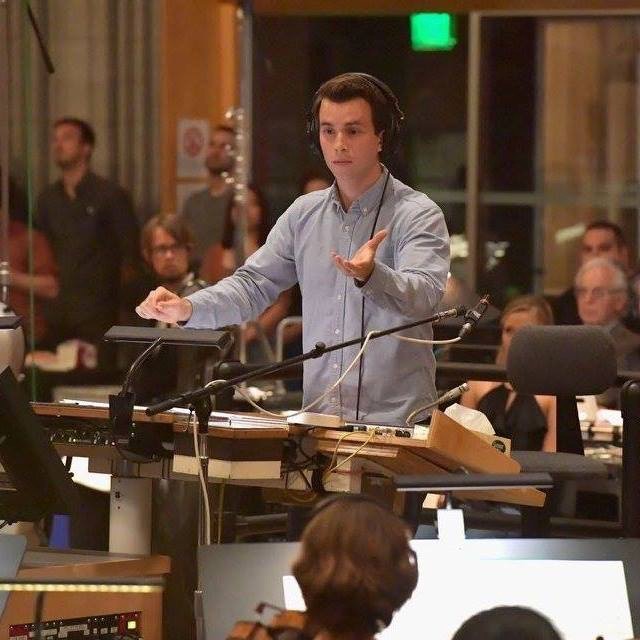
[caption id="attachment_58805" align="alignnone" width="640"] Forrest Gray conducting his final piece at the ASCAP Film Scoring Workshop .[/caption]
Forrest Gray conducting his final piece at the ASCAP Film Scoring Workshop .[/caption]
By Christine Sampson
At 16 years old, Forrest Gray composed a song that would accompany the final scene and closing credits of the documentary “And Everything is Going Fine,” which chronicled the life and career of Mr. Gray’s father, the late author and actor Spalding Gray.
The song was titled “Sunset,” but it was the dawn of Forrest Gray’s career as a composer of film scores. Fast-forward eight years, and it’s safe to say the Sag Harbor native and 2010 Ross School graduate has amassed a list of achievements that make him an up-and-coming Hollywood talent.
Mr. Gray was the recipient of a BMI Student Composer Award from Berklee College of Music, where he earned a degree in film scoring, and in 2015, after he completed a master’s degree in film scoring at the University of Southern California, he was chosen for a prestigious fellowship to the Sundance Composer Lab. He was one of six participants chosen from among 500 people who applied for the program, which was held on director and producer George Lucas’s famed Skywalker Ranch in northern California.
[caption id="attachment_58800" align="alignright" width="456"] Forrest Gray, second from right, on the red carpet after receiving a development deal for the pilot, "Limited Space."[/caption]
Forrest Gray, second from right, on the red carpet after receiving a development deal for the pilot, "Limited Space."[/caption]
Mr. Gray, who started out in music with drums and the guitar but now primarily plays the piano, called the fellowship his “first big break.”
“Personally, I can attribute all my opportunities after that to that experience. … I couldn't process it at the time, but it definitely helped established my career at such a young age,” he said. “I think I'm farther along in my career than I thought I would be. I've been really lucky.”
Mr. Gray has worked as an arranger on an album by the pop singer Mike Posner, and he is the composer on “Limited Space,” an animated musical show in development by Bento Box Entertainment, which is best known for the series “Bob’s Burgers.” When he returns to Los Angeles later this week, he’ll be working on a Universal Studios family comedy that cannot be named just yet.
He immerses himself in music on a daily basis, spending as many as 14 hours per day composing and practicing. He has also sought out teaching opportunities – which led to what he described as “one of the most humanizing experiences” in his life.
On December 17, Mr. Gray returned from Lesbos, Greece, where he volunteered for three weeks as a teacher with the ART Angels Relief Team, a nonprofit organization that teaches music to refugee children. He helped organize, and also performed in, a concert that was aimed at uniting the native Lesbos residents and the refugees living in the camps there. His main takeaway from the experience was his belief that instilling a standard educational system, structure and values for the young refugees is extremely important – and that music education can help achieve that goal.
“My fear is that as they resettle, a lot of them won't have a real semblance of normalcy and structure. I saw a lot of aimlessness at the camp,” Mr. Gray said. “…I think there should be more standardized education there, but I'm sure they can't mandate those things. My biggest fear for them is in a new country where half the population might not want them there, where they might not know the language there, you could see the seeds of what could end up being a disenfranchised population.”
Here on the South Fork, Mr. Gray studied jazz music at the Ross School with the late Hal McKusick, and he also credits Ross teachers Therese Lichtenstein and Carlton Schade, who teach film appreciation and environmental science, respectively, with influencing his creative and inquisitive nature. He also studied with Bruce Wolosoff, a composer from Shelter Island, and took guitar lessons with Johnny Blood, a local musician. He credits his parents, of course, with nurturing his interests in both music and film.
In his work, Mr. Gray strives for “a seemingly unattainable goal of perfection.”
“You should always strive to be greater,” he said. “Seldom am I completely happy about the work I've done and I think that's actually a really good thing. I think anyone who is creative should set that standard for themselves. I'll probably die that way. Not to sound too dramatic.”